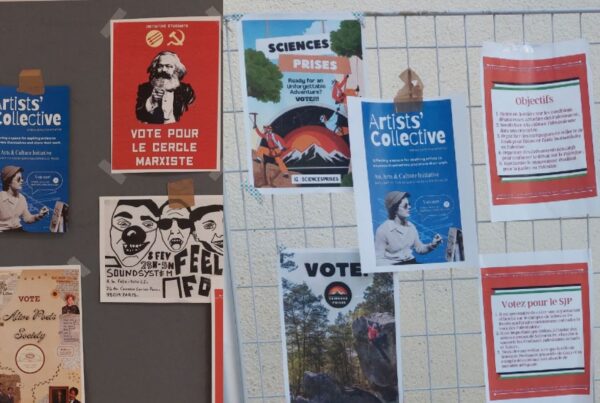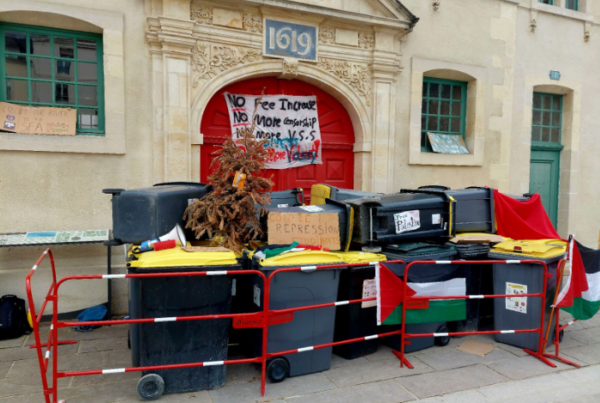Image credit: Elena Martín Ortega
Draped in rich blues and fiery oranges amidst many traditional and colourful gowns, the African Mosaic Gala Opening Ceremony on February 15 officially launched African Week. A weeklong celebration of African culture, history, and resilience brought together a diverse range of events and collaborations organized by ASPA. Different associations, including the BDE and BDA, The Feminist Society, AS, Unframed, and SciencesPolémiques, joined forces to provide students with various events to explore the themes of African heritage and contemporary issues.
Despite the festive atmosphere of the DJ set and lively party music by Elefunk during opening night, the ASPA team took a moment to address the ongoing crisis in the Democratic Republic of Congo, condemning the M23 Rebels’ control over the country as the “worst humanitarian crisis to date” (more information on their Instagram @aspa.reims). The executive members particularly highlighted the need for action, encouraging their fellow peers to engage with their video chronicling the events of the emergency.
Following these crucial insights, the night maintained its vibrant energy with a captivating performance by Congolese choreographer Kalo Tshiekela and traditional Congolese dancers, inviting the attendees to watch and follow along. After the dancers pulled students center-stage to join them, the music continued, carrying the animated ambiance until 2 in the morning.
The following week, ASPA had on-campus stands and textile exhibitions in the Salle des Actes. Amongst the activities was the Tombola stand offering students the chance to win prizes such as two Burna Boy concert tickets, a Tyla vinyl, a Bambi meal, two awalés, and books including “Contes initiatiques peuls” by Amadou Hampâté Bâ and “L’Afrique noire pré-coloniale” by Cheikh Anta Diop. This stand remained throughout the week, inviting any passerby to learn more about the daily events. ASPA members also shared their thoughts and critiques on the decolonization process within their own cultures in their magazine entitled “Decolonize our minds! Decolonize the look!,” prompting students to consider different discussions on the discrimination faced by African women, voodoo and musical traditions, and precolonial Africa.
Other creativity-based outlets were promoted on February 17, with storyteller, singer, and poet Ze Jam Afane recreating the chantefables of his childhood in Southern Cameroon. Meanwhile, Unframed organized a collaboration screening of Mati Diop’s new film “Dahomey” which explores France’s colonial legacy in Benin and the need to repatriate stolen artworks.
On February 18, students took part in a culinary bonding experience, where they made Attiéké au Poulet, a dish from the Ivory Coast, and plantain-based meals.
Students also had the opportunity to engage in a more dialogue–based approach at a round table held entitled “Le passage de la france-afrique à ‘l’africa-france’.” This covered the ever-changing partnership and contemporary issues between France and the African continent, inciting students to reflect on the goal, and associated challenges, of reinventing Franco-African relations. It particularly explored the lingering effects of colonization and French military presence in many African countries, as well as its impact on countries’ security dynamics. Among the guest speakers were Antoine Glaser, Gabriel Poda, and Lamine Sow. Journalist and former Africa Intelligence editorial director Glaser analyzed the role of French companies in the decline of Françafrique, France’s dominance in its former African colonies. Poda, an international relations consultant specializing in peace and security in Africa, delved into the perception of France by African youth. Sow, a former editor in charge of influence diplomacy at the Ministry of Europe and Foreign Affairs, provided an insider-perspective on France’s efforts to renew strong ties with Africa. He additionally offered students advice about careers in diplomacy and at the Quai d’Orsay.
On February 19, a dance workshop led by Amazigh artist and choreographer Raïssa Leï was organized in collaboration with the AS. The dancer, who specializes in Berber dances, demonstrated how dance can merge sport with cultural expression. Focusing on the reggada, she explained that through movements mimicking a rifle, a symbol of victory against the Spanish invasion, the dancers carry on a Moroccan warrior tradition. There was an additional dance using shoulder movements to imitate the swaying of wheat during harvests, reflecting the connection between nature and cultural practices. Regardless of participants’ level, this workshop offered participants a “rich experience, blending history and culture through movement,” according to the AS. This was finalized with a visit to the Atrium Club in collaboration with the BDE under the guise “Aspatrium.”
The next day brought about another roundtable led by Kako Nubukpo entitled “L’Afrique. De la dépendance à la souveraineté?.” Nubukpo, a renowned economist and former Togolese minister, explored questions and solutions for food security, monetary and ecological sovereignty, and governance issues on the continent. He also provided an analysis of economic policies and development issues in Africa discussed within his latest book “Africa and the Rest of the World: From Dependence to Sovereignty.”
From further exploring African artistry by receiving and learning more about Henna designs to a second film projection being held alongside DIAASPORA, ASPA culminated the week with a full-day stand of activities on the 21st. In collaboration with La Boutique Kulturel, a stand was set up in the Salle des Actes. The boutique sold traditional fabrics, perfumes, nourishing hair care, an assortment of jewelry, small trinkets, and African trivia card games. Students were additionally invited to bring their own fabrics – whether it be plain cotton, batik, or something completely different – and attend a workshop showcasing the art of the MawéTèt Missoro Headwrapping Attaché led by the same organization.
As a final surprise, a round table in collaboration with SciencesPolémiques with specialist in comparative historical sociology of politics Jean-François Bayart was held. Students had the opportunity to engage and exchange ideas with the author of works covering sub-Saharan Africa and the historicity of politics.
Thus, as stated by ASPA’s organizers, this week of African discovery was “much more than a cultural celebration: it [was] a commitment to shine our heritage, to create connections and to open (and decolonize) minds. Each shared moment [was] an opportunity for discovery and learning. We are happy to have been able to carry this project one more year thanks to ASPA!”
Other posts that may interest you:
- From Practice to Podium: A Look at the Heart of Competitive Debate
- The Changing Face of Student-led Initiatives
Discover more from The Sundial Press
Subscribe to get the latest posts sent to your email.





